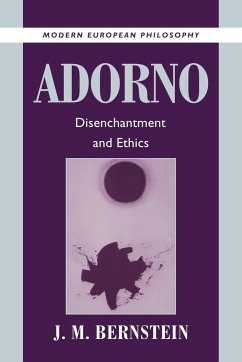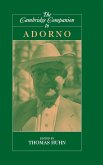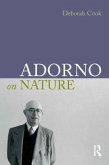Theodor W. Adorno is best known for his contributions to aesthetics and social theory. Critics have always complained about the lack of a practical, political or ethical dimension to Adorno's philosophy. In this highly original contribution to the literature on Adorno, J. M. Bernstein offers the first attempt in any language to provide an account of the ethical theory latent in Adorno's writings. Bernstein relates Adorno's ethics to major trends in contemporary moral philosophy. He analyses the full range of Adorno's major works, with a special focus on Dialectic of Enlightenment, Minima Moralia and Negative Dialectics. In developing his account Bernstein lays particular stress on Adorno's contention that the event of Auschwitz demands a new categorical imperative. This book will be widely acknowledged as the standard work on Adorno's ethics and as such will interest professionals and students of philosophy, political theory, sociology, history of ideas, art history and music.
Table of contents:
Introduction; 1. Wrong life cannot be lived rightly; 2. Disenchantment: the skepticism of enlightened reason; 3. The instrumentality of moral reason; 4. Mastered by nature: abstraction, independence, and the simple concept; 5. Interlude: three versions of modernity; 6. Disenchanting identity: the complex concept; 7. Toward an ethic of nonidentity; 8. After Auschwitz; 9. Ethical modernism.
Theodor W. Adorno is best known for his contributions to aesthetics and social theory. In this highly original contribution to the literature on Adorno, J. M. Bernstein offers the first attempt in any language to provide an account of the ethical theory latent in Adorno's writings.
Provides the first account in any language of the ethical theory latent in Adorno's writings.
Hinweis: Dieser Artikel kann nur an eine deutsche Lieferadresse ausgeliefert werden.
Table of contents:
Introduction; 1. Wrong life cannot be lived rightly; 2. Disenchantment: the skepticism of enlightened reason; 3. The instrumentality of moral reason; 4. Mastered by nature: abstraction, independence, and the simple concept; 5. Interlude: three versions of modernity; 6. Disenchanting identity: the complex concept; 7. Toward an ethic of nonidentity; 8. After Auschwitz; 9. Ethical modernism.
Theodor W. Adorno is best known for his contributions to aesthetics and social theory. In this highly original contribution to the literature on Adorno, J. M. Bernstein offers the first attempt in any language to provide an account of the ethical theory latent in Adorno's writings.
Provides the first account in any language of the ethical theory latent in Adorno's writings.
Hinweis: Dieser Artikel kann nur an eine deutsche Lieferadresse ausgeliefert werden.








